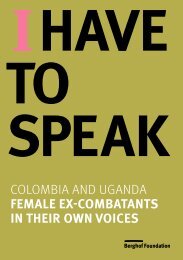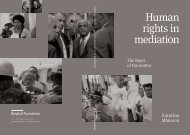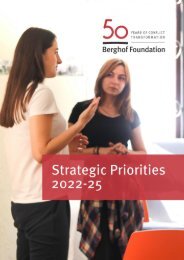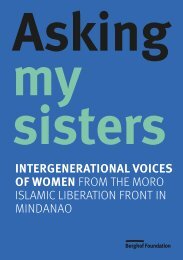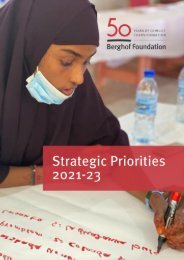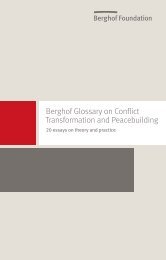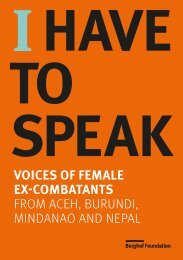Berghof Foundation: 50 years of conflict transformation
This book provides an overview of the Berghof Foundation’s work and impact over the past 50 years and sheds light on the challenges ahead of peacebuilding.
This book provides an overview of the Berghof Foundation’s work and impact over the past 50 years and sheds light on the challenges ahead of peacebuilding.
You also want an ePaper? Increase the reach of your titles
YUMPU automatically turns print PDFs into web optimized ePapers that Google loves.
Supporting peace from<br />
below in the aftermath<br />
<strong>of</strong> the Cold War<br />
1990s<br />
The end <strong>of</strong> the Cold War, the dissolution <strong>of</strong> the Soviet<br />
Union, the breakdown <strong>of</strong> former Yugoslavia, the more<br />
or less radical regime changes in Eastern Europe<br />
and the reunification <strong>of</strong> Germany characterised<br />
the political landscape <strong>of</strong> the early 1990s. During<br />
this period, 22 new states were (re-)established,<br />
many <strong>of</strong> which immediately experienced violent<br />
political <strong>conflict</strong>s. A key driver <strong>of</strong> these <strong>conflict</strong>s was<br />
tension between ethno-national minorities who had<br />
managed to co-exist in the Soviet Union, Yugoslavia<br />
and in the communist states <strong>of</strong> Eastern Europe. Yet,<br />
in the newly emerging nation-states, the majority<br />
community insisted on retaining a dominant position.<br />
These <strong>conflict</strong>s particularly affected Croatia, Serbia,<br />
Bosnia-Herzegovina, Kosovo and several regions <strong>of</strong><br />
the Soviet Union, as well as Eastern European states<br />
with significant minority communities.<br />
As new regional or national majorities or<br />
minorities were created in the borders <strong>of</strong> these ‘new’<br />
states, the institutions <strong>of</strong> the old communist states —<br />
socialist parties, trade unions and various strategic<br />
elites — ceased to be the dominant decision-makers.<br />
Emerging political leaders like Slobodan Milosevic<br />
<strong>of</strong>ten referenced the grandiose or painful past in<br />
order to justify their communities’ and their<br />
personal leadership claims.<br />
Like many other observers, the <strong>Bergh<strong>of</strong></strong><br />
<strong>Foundation</strong> was tempted to find entry points for<br />
<strong>conflict</strong> <strong>transformation</strong> in the quickly evolving<br />
federal landscapes <strong>of</strong> the Western Balkans and the<br />
former Soviet Union. After closer investigation, we<br />
realised that — due to our background with issues<br />
<strong>of</strong> minority protection in multi-ethnic contexts —<br />
our team at the time was best equipped to deal with<br />
a more latent <strong>conflict</strong> occurring in Romania after the<br />
revolution <strong>of</strong> December 1989 between the Romanian<br />
majority community and the Hungarian minority<br />
in Transylvania, a region which had belonged to<br />
Hungary prior to World War I. Developments in<br />
the city <strong>of</strong> Targu Mures in March 1990, seen as<br />
a potential trigger for something similar to what<br />
happened in Yugoslavia, motivated us to study the<br />
situation in detail and consult with partners from<br />
and in Romania.<br />
Over the next few months, we developed<br />
a training concept for a group <strong>of</strong> junior politicians,<br />
representatives <strong>of</strong> youth organisations and religious<br />
leaders with a high potential <strong>of</strong> reaching other<br />
interested and influential groups. Participants<br />
learned about analysing and transforming political<br />
<strong>conflict</strong>s and how to engage with each other<br />
effectively across different identity groups. Based<br />
on experiences in other projects, we were aware<br />
<strong>of</strong> the need to create long-lasting interpersonal<br />
exchanges, which is why we organised several<br />
week-long seminars spread out over three <strong>years</strong><br />
in different countries and environments.<br />
Several <strong>of</strong> the participants — particularly<br />
those with an academic, political, educational<br />
or religious background — made use <strong>of</strong> the tools<br />
from our events in various ways, with one group<br />
generating their own training course and some <strong>of</strong><br />
the participating politicians and academics making<br />
use <strong>of</strong> <strong>Bergh<strong>of</strong></strong>´s guest scholarship programme<br />
to develop their own ideas and proposals for a<br />
settlement <strong>of</strong> the Romanian-Hungarian <strong>conflict</strong>.<br />
An <strong>of</strong>ficial press event to present the issues and<br />
results <strong>of</strong> the project was organised in May 1995 in the<br />
Council <strong>of</strong> Europe’s Romanian Office in Bucharest.<br />
One year later, in September 1996, Romania<br />
and Hungary signed a Treaty <strong>of</strong> Understanding,<br />
Cooperation and Good Neighbourliness.<br />
The lessons from the Transylvania project<br />
encouraged <strong>Bergh<strong>of</strong></strong> to expand its outreach to other<br />
regions in Central and Eastern Europe. Workshops<br />
in Moscow (1995) and Warsaw (1996) saw a group<br />
<strong>of</strong> <strong>50</strong> peace and minority rights activists grappling<br />
with how to manage, settle and transform <strong>conflict</strong>s<br />
in line with the concepts <strong>of</strong> ‘good governance’ and<br />
‘participatory democracy’. Only 16 <strong>of</strong> the participants<br />
were affiliated with formal NGOs — the vast majority<br />
belonged to informal networks, some working as<br />
solo activists in their respective countries and<br />
regions. They examined cases covering a broad<br />
spectrum within what is currently called ‘illiberal<br />
peacemaking,’ such as the Chechen-Russian <strong>conflict</strong>,<br />
the consensual dissolution <strong>of</strong> Czechoslovakia and<br />
the settlement <strong>of</strong> several <strong>conflict</strong>s between various<br />
republics and the Russian federal government.<br />
These workshops focused on multi-ethnic<br />
community- and bridge-building, but also covered<br />
advocacy for non-violence and minority rights,<br />
mediation, and empowerment. The experience and<br />
lessons learned during these explorations would<br />
influence our work in many other contexts over the<br />
subsequent decades.<br />
40<br />
41




